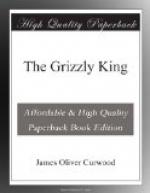It was the first revelation to him. He put up his hands. They touched her face. Some potent spirit in him carried him across all gulfs. In that moment, thrilling, strange, he was heart and soul of the First People. In an instant he had drifted back a thousand years, beyond the memory of cities, of clubs, of all that went with civilization. A wild, half savage longing filled him. One of his hands slipped to her shining hair, and suddenly their faces lay close to each other, and he knew that in that moment love had come to him from the fount of glory itself.
* * * * *
Days followed—black days filled with the endless terrors of the storm. And yet they were days of a strange contentment which Roscoe had never felt before. Oachi and her father were with him a great deal in the tepee which they had given up to him. On the third day Roscoe noticed that Oachi’s little hands were bruised and red and he found that the chief’s daughter had gone out to dig down through ice and snow with the other women after roots. The camp lived entirely on roots now—wild flag and moose roots ground up and cooked in a batter. On this same day, late in the afternoon, there came a low wailing grief from one of the tepees, a moaning sound that pitched itself to the key of the storm until it seemed to be a part of it. A child had died, and the mother was mourning. That night another of the camp huntsmen failed to return at dusk.
The next day Roscoe was able to move about in his tepee without pain. Oachi and her father were with him when, for the first time, he got out his comb and military brushes and began grooming his touselled hair. Oachi watched him, and suddenly, seeing the wondering pleasure in her eyes, he held out the brushes to her. “You may have them, Oachi,” he said, and the girl accepted them with a soft little cry of delight. To his amazement she began unbraiding her hair immediately, and then she stood up before him, hidden to her knees in her wonderful wealth of shining tresses, and Roscoe Cummins thought in this moment that he had never seen a woman more beautiful than the half Cree girl. When they had gone he still saw her, and the vision troubled him. They came in again at night, when the fire was sending red and yellow lights up and down the tepee walls, and the more he watched Oachi the stronger there grew within him something that seemed to gnaw and gripe with a dull sort of pain. Oachi was beautiful. He had never seen hair like her hair. He had never before seen eyes more beautiful. He had never heard a voice so low and sweet and filled with bird-like ripples of music. She was beautiful, and yet with her beauty there was a primitiveness, a gentle savagery, and an age-old story written in the fine lines of her face which made him uneasy with the thought of a thing that was almost tragedy. Oachi loved him. He could see that love in her eyes, in her movement; he could feel it in her presence,




